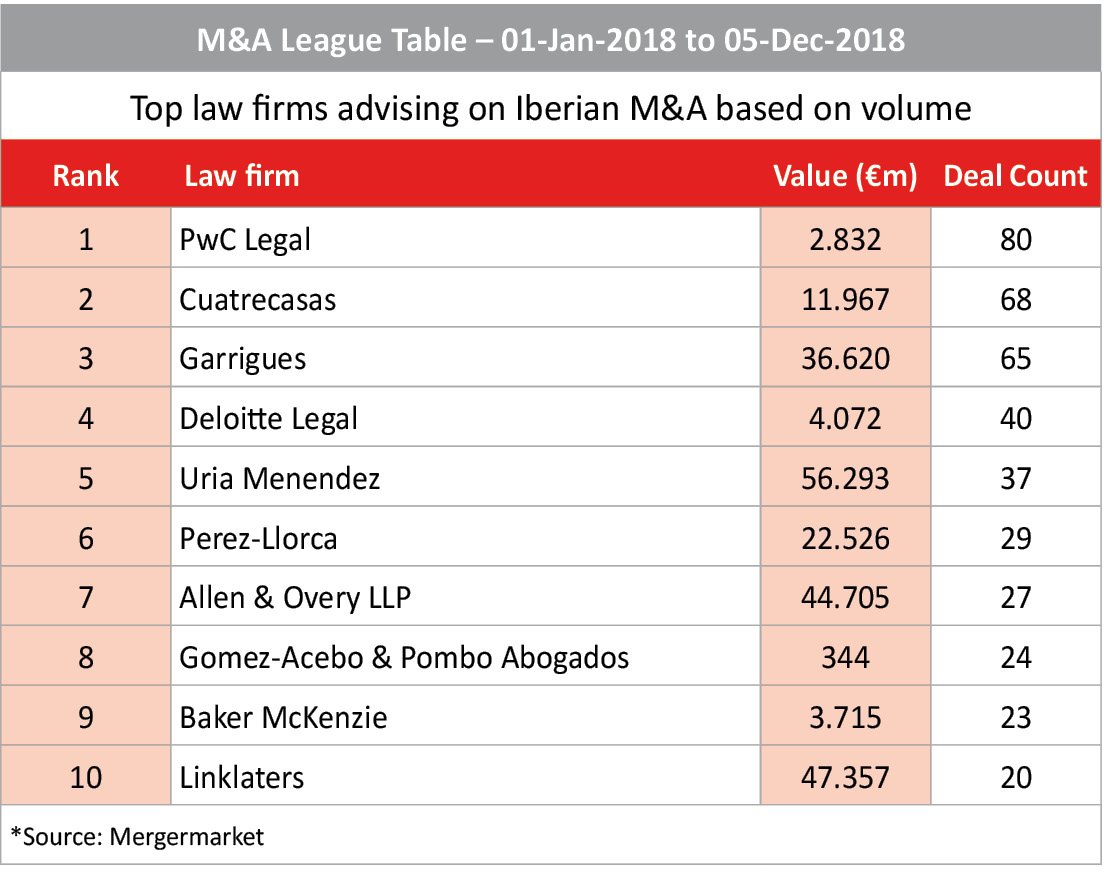Brexit could negatively affect Spanish M&A levels in 2019
Increased protectionism with regard to investment and trade could lead to investors in Spain becoming more cautious, lawyers warn
Concerns about a decline in M&A activity in Spain in 2019 are growing, with lawyers anticipating that Brexit, as well as increased protectionism more generally in global markets, could have a negative effect on deal flow as investors become nervous.
The year 2018 has, in general, been a good year for M&A lawyers in Iberia with significant transactions in the energy sector, in particular. Notable deals included Garrigues, Clifford Chance, Linklaters and Pérez-Llorca advising on CVC Capital Partners’ €3.8 billion acquisition of a 20 per cent stake in Gas Natural Fenosa from Repsol. In addition, there has also been significant activity in the real estate sector – in one significant recent transaction,
Freshfields Bruckhaus Deringer advised the Qatar Investment Authority on the sale of a 22 per cent stake (valued at €718 million) in France’s Société Foncière Lyonnaise to Spanish real estate investment trust Colonial, which instructed Ramón & Cajal.
Meanwhile, lower value deals have been common. Juan Martín Perrotto, partner at Uría Menéndez, says: “In terms of volume, smaller deals have been popular in the food and restaurant sectors, which are receiving investment from private equity.” Investors are also targeting assets in the technology sector. Álvaro López-Jorrín, partner at Garrigues, says: “There is an increasing appetite among international funds for Spanish and Portuguese tech companies.” The substantial growth of the technology sector in Iberia has led to a surge in mid-market deals, though such transactions may not represent the best M&A opportunities at present. “The highest value is still found in deals involving large companies,” says Victor Xercavins, partner at Cuatrecasas in Barcelona. He adds: “We’re seeing buyouts, asset acquisitions and lots of private equity and venture capital – especially cross-border M&A.”
Most deals are being completed by international investors, and Xercavins says traditional funds, private equity and venture capital remain major players in the Spanish market. He adds: “Furthermore, large companies and family offices are creating their own investment vehicles.” Meanwhile, in Portugal, private equity funds continue to be quite active in the market, says Mónica Martín de Vidales, partner at Garrigues in Madrid. “They are taking advantage of a favourable leverage environment and a large number of assets that have been put on sale.”
 Rumours spreading
Rumours spreading
Looking ahead, while lawyers are reasonably optimistic about the prospects for the early part of 2019, López-Jorrín warns that signs of instability could result in a decrease in transactions in Spain. “With political stability and relative financial growth, we see no reason for a decrease in M&A activity in Portugal in the months to come,” he says. “However, in Spain, rumours about a decrease in activity are starting to be heard.” Meanwhile, the lack of clarity on the UK’s future relationship with the EU is likely to result in M&A activity slowing, analysts have warned. Perrotto says there is an expectation that Brexit and the effects of increased protectionism with regard to investment and trade will prompt investors in Spain to become more cautious and wary. “This will not stop big strategic transactions from happening, it will affect volume more than value,” he explains. “However, in Portugal, the relatively stable legislative and fiscal environment may lead to another good year for M&A.” However, Xercavins argues that the boom period for M&A in Spain is not over. “I do not think we have reached the top of the market,” he says. “The figures, both in terms of value and number of transactions, will continue to soar – the market is highly active and Iberia is back on the map.”












